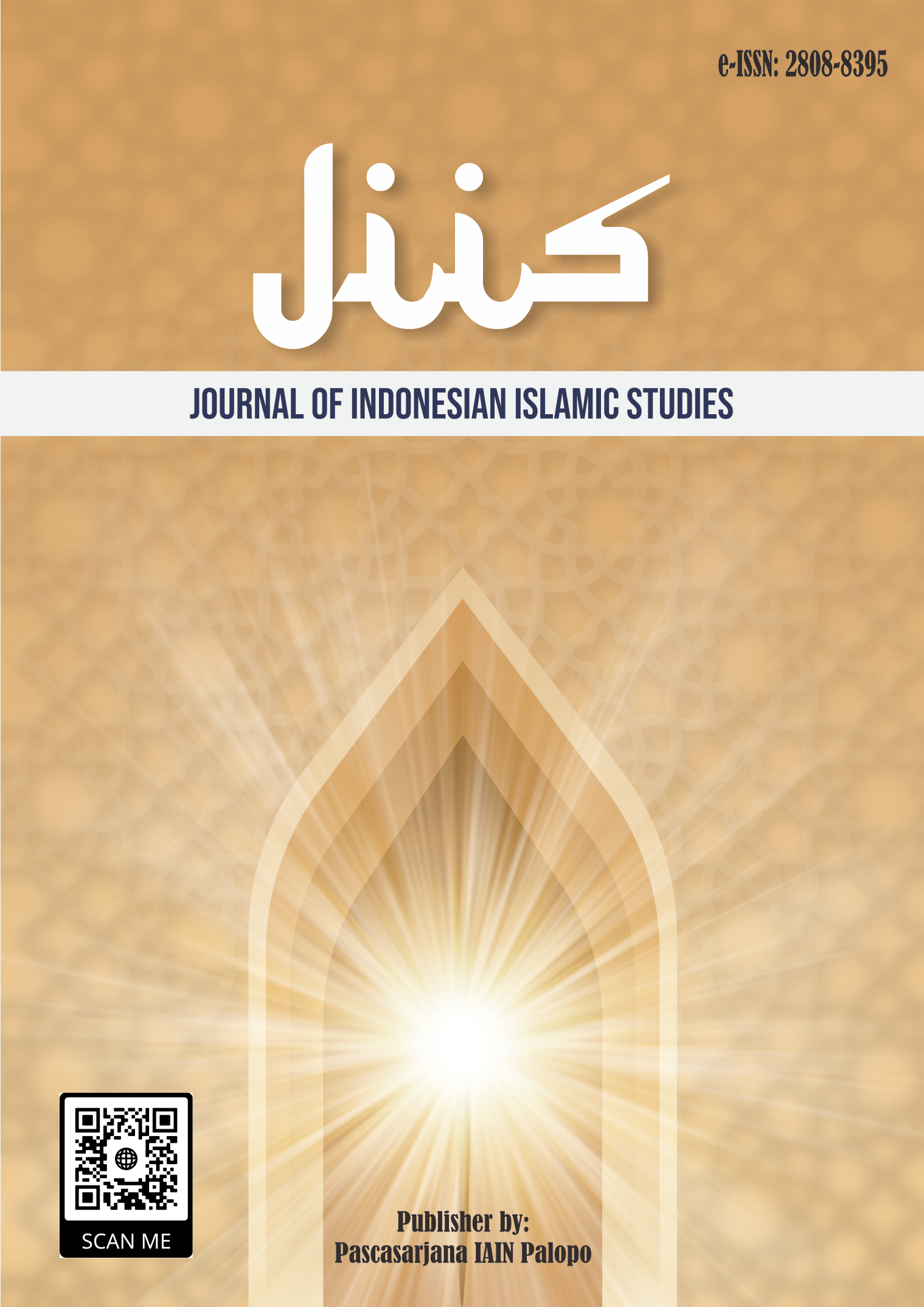Values of Islam in The Local Wisdom of The Tomakaka Community of North Luwu, South Sulawesi
DOI:
https://doi.org/10.24256/jiis.v4i1.4950Keywords:
Local Wisdom, Religion, Culture, TomakakaAbstract
Cultural heritage in Indonesia, apart from having high historical value, is also closely linked to spiritual and religious values. However, in this modern era, local wisdom and customs are underestimated by millennials. Assumptions about ethnicity and culture that are even considered deviant from religious teachings. Culture is considered taboo and not worth preserving. Traditional habits that should become local wisdom are actually increasingly shifting and almost disappearing one by one. In this regard, the researcher intends to conduct research to review the religious values contained in the local wisdom of the Tomakaka people of North Luwu district, South Sulawesi. This is intended so that local wisdom as regional culture can continue and continue to exist in the onslaught of the modern world. The relationship between religious and cultural values is a complex and multidimensional subject. Religion is often a moral pillar in culture, shaping values, norms, and social institutions. However, culture also influences the way religion is practiced and interpreted in everyday life. Understanding this relationship is the key to embracing cultural and religious diversity throughout the world as well as the religious values contained in the local wisdom of the Tomakaka people of North Luwu, starting from the traditions of Toke' Sampa', Mapalesso Samaja, Massolo', Tudang Sipulung, and Ma'bunga ' Lalang..
References
Abidin, Zaenal. (2021). Model of Strengthening Religion through School Religious Culture. Muddarissuna Journal. https://scholar.google.com/scholar?start=30&q=nilai+agama+dan+budaya&hl=id&as_sdt=0, 5
Ardi, Ahmad Sultan. (2023). Symbolic Meaning of Rongkong Woven Cloth Motif, Rongkong District, North Luwu Regency. Paratiwi Journal of Fine Arts and Design. http://eprints.unm.ac.id/27387/1/Artikel_Ahmad%20Sultan%20Ardi_1881040014%20-%20ahmad%20sultan%20ardi.pdf
Ashhari, Ardian. (2017). Scientific Literacy based on Islamic Values and Indonesian Culture. Al- BiRuNi Physics Education Scientific Journal. http://download.garuda.kemdikbud.go.id/article.php?article=911871&val=7949&title=Literas i%20Sains%20Berbasis%20Nilai-Nilai%20Islam%20dan%20Budaya%20Indonesia
Aswar, N., Silpia, P., & Zainuddin, F. (2024). Pengembangan E-book Berbasis Flipbook Maker pada Materi PAI Kelas VII SMP Negeri 3 Palopo. Jurnal Riset Dan Inovasi Pembelajaran, 4(2), 1497-1508. https://doi.org/10.51574/jrip.v4i2.1878
Aswar, N., Daud, D., Soares, A., Guntur, M., & Afdholis, A. (2024). Pelatihan dan Pendampingan Siswa dalam Membuat Puisi melalui Metode Karyawisata di Sekolah Dasar An-Nur, Dili Timor Leste. Madaniya, 5(3), 928-936. https://doi.org/10.53696/27214834.880
Haryanto, Joko Tri. (2015). Relation of Religion and Culture in Internal Relations of Muslims. Semarang: Researcher at the Research and Development Center for Religion. https://journal.blasemarang.id/index.php/smart/article/view/228
Johan, Saniar. (2020). Reconstructing the Role of Tomakaka in Resolving Sipallaian Customary Cases in Masamba District, North Luwu Regency. IAIN Palopo. https://scholar.google.com/scholar?hl=id&as_sdt=0%2C5&q=tomakaka+luwu+utara&btnG=
Khasanah, S. N., Sukirman, S., & Aswar, N. (2024). Implementasi Model Teams Games Tournaments dalam Meningkatkan Hasil Belajar Peserta Didik. Jurnal Konsepsi, 13(1), 36–53. Retrieved from https://www.p3i.my.id/index.php/konsepsi/article/view/345
Mahfuz, Abd Ghoffar. (2019). The Relationship between Religion and Culture: A Sociocultural Overview. TwShiyah Vol.14.No. 1. https://www.lp2msasbabel.ac.id/jurnal/index.php/taw/article/view/1143
Muthia Cut. (2021). Islamic Religious Values in the Culture and Customs of the Acehnese People. Islamic Broadcasting Communication Research Journal. https://journals.unisba.ac.id/index.php/JRKPI/article/view/170
Putri, N. D., Rosdiana, R., & Aswar, N. (2024). Pengembangan Modul Pembelajaran Berbasis Self Directed Learning Tema Sumber Energi di Madrasah Ibtidaiyah. Jurnal Konsepsi, 13(1), 1–19. Retrieved from https://www.p3i.my.id/index.php/konsepsi/article/view/343
Suradarma, Ida Bagus. (2018). Revitalization of Religious Moral Values in the Era of Globalization through Religious Education. Denpasar: STIMIK STIKOM Bali. https://scholar.google.com/scholar?start=20&q=nilai+agama+dan+budaya&hl=id&as_sdt=0, 5
Tayyib, Magfirah. (2022). Luwu People's Language Wisdom in the Ma'bunga' Lalang Tradition. Palopo: IAIN Palopo. http://download.garuda.kemdikbud.go.id/article.php?article=3216636&val=14700&title=KE ARIFAN%20BERBAHASA%20MASYARAKAT%20LUWU%20DALAM%20TRADISI%20MABUNGA%20LALANG%20Language%20Courtesy%20of%20Luwu%20Society%20in%20Mabunga%20Lalang%20Tradition
Wulan. (2023). Mappile Wettu Tradition in Bugis Community Marriages in West Malangke District, North Luwu Regency, Islamic Law Perspective. Palopo: IAIN Palopo. https://www.google.com/url?sa=t&source=web&rct=j&opi=89978449&url=http://repository. iainpalopo.ac.id/id/eprint/8070/&ved=2ahUKEwiEu8uYyo6FAxWHamwGHRzwAfkQFnoE CBEQAQ&usg=AOvVaw0LebRZzd43fa_9B1kgsKqn
Yunus. (2020). Tudang Sipulung Model in Islamic Learning and Local Wisdom. Jakarta: Indonesian Journal of Educational Management. https://serambi.org/index.php/managere/article/view/89
Downloads
Published
How to Cite
Issue
Section
Citation Check
License
Copyright (c) 2024 Eka Purnamasari

This work is licensed under a Creative Commons Attribution 4.0 International License.
Authors who publish with the Journal of Indonesian Islamic Studies agree to the following terms:
- Authors have retained full articles copyright and grant the Journal of Indonesian Islamic Studies right of first publication with the work simultaneously licensed under Creative Commons Attribution License (CC BY 4.0) that allows others to share the work with an acknowledgement of the work's authorship and initial publication in this journal.
- Authors can enter into separate, additional contractual arrangements for the non-exclusive distribution of the Journal of Indonesian Islamic Studies published version of the work (e.g., post it to an institutional repository or edit it in a book), with an acknowledgment of initial publication in this journal.
- Authors are permitted and encouraged to post their work online (e.g., in institutional repositories or on their website) before and during the submission process, as it can lead to productive exchanges, as well as earlier and greater citation of published work (see also deposit policy and archiving on page journal).









